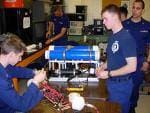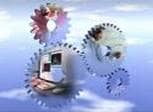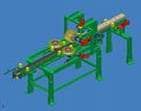INTRODUCTION
Mechanical engineering is a frontier branch of engineering discipline which involves the application of laws and principles of Physics to analyze, design, manufacture, and maintain the mechanical systems. The system may comprise moving solid elements - components - combined to create a mechanism or machine. Alternatively, it may involve a fluid flowing within or around a solid structure.



The industry offers a wide choice of options extending across many interdisciplinary interdependent specialties. Mechanical engineers also do research, develop, design and test tools, engines, machines, and other mechanical devices. They work on power-producing machines such as electric generators, internal combustion engines, and steam and gas turbines as well as power-using machines such as refrigeration and air-conditioning equipment, machine tools, material handling systems, elevators and escalators, industrial production equipment and robots used in manufacturing. The Mechanical engineers may work in production operations in manufacturing or agriculture, maintenance, or technical sales; many are also absorbed as administrators or managers. They share interests with many other engineers like Civil Engineers in structures and stress analysis; Electrical engineers in electronics, computing and control theory; Aeronautical Engineers in fluid flow and turbo machinery etc and also design tools needed by other engineers for their work.
The most important attribute of mechanical engineers lies in the combination of abilities that they possess. They are able to understand and follow the laws of science while simultaneously being able to engage in the creative process of design to fashion new artifacts and products. Mechanical Engineering students acquire an understanding of the fundamentals of mechanics and of the thermal energy sciences. They learn to perform interactive design tasks using computers and to select the most appropriate materials for a specific application. They also become familiar with the chemical and electrical sciences, which are often essential to the total design and realization of a mechanical system. And they also learn to keep the ecosystem in mind when designing solutions to technical problems.
With the rapid rate of expansion in the industrial sector, the employment potential for mechanical engineers is very high. Mechanical engineers are needed in various public and private sector companies including the automobiles, chemical, electronics, steel plants, oil exploration and refining, technical wings of armed forces, space research organization and many other fields.
Candidates with post graduate degree or an additional management degree could find work in administrative and managerial positions in government departments or public and private sector industries or do research as well as teaching in Research and teaching institutes. Aeronautical, agricultural, automobile, chemical, and power plants, as well as the railways, need mechanical engineers to design and maintain their machinery.
Government sector recruits various positions like
• Junior Engineers
• Assistant Engineers
• Assistant Executive Engineers
• Executive Engineers
• Superintendent Engineers
Famous personalities


During the year 1885, Rudolf established his first shop-laboratory in Paris and began his 13-year ordeal of creating and developing his distinctive engine. He moved to the Berlin branch to continue his search for an efficient internal-combustion engine, in 1890. In 1892, he received a patent for his internal-combustion engine, which utilized auto-ignition of fuel. His ideas for a machine where the combustion would be transported within the cylinder were published. On August 10, 1893, in Augsburg, Diesel's prime model, which was composed of only a 10-foot iron cylinder with a flywheel at its base, operated on its own power for the first time. For ten years he developed various heat engines, including a solar-powered air engine. Diesel spent two more years at improvements and in 1896; he presented an enhanced model that was very successful commercially .He constructed the first successful diesel engine, employing low-cost fuel while he was associated with the Krupp firm in Essen. His "rational heat motor" demonstrated the first compression-ignition engine in 1897. Commercial manufacture was delayed another year and began at a very gradual pace. However, by 1898 Diesel became very wealthy from franchise fees in great part international. His engines were utilized to power electric and water plants, pipelines, automobiles and trucks, and marine craft, and soon after were employed in applications that included oil fields, mines, factories, and transoceanic shipping. Rudolf spent most of his life at his factory in Augsburg.On September 29, 1913, while on a voyage to London, England, Diesel was lost overboard from the steamer Dresden and drowned in the English Channel.
Horoscope - Career for Zodiac Signs
So if you are inclined to take up your career in this discipline then just check out these sun signs which are in favour of mechanical engineering.
 Aries
Aries
 Virgo
Virgo
 Capricorn
Capricorn
Eligibility : Click here for more information
Institutes : Some of the prominent institutions offering courses in Mechanical Engineering can be had from the following links.. Click here for more information